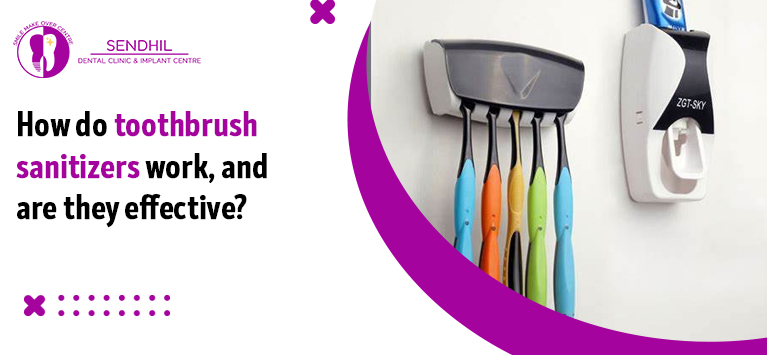
How do tooth sanitisers work, and are they effective?
If you want to enhance your oral health, any dentist will tell you that brushing your teeth twice daily and flossing is an excellent place to start. Despite this, various products promote themselves as the secret to a better, healthier smile.
Toothbrush sanitisers are a popular hygiene product that has lately gained popularity—but are they a wise investment? In this article, our specialists delve deep into the subject to uncover that toothbrush disinfectants are both safe and valuable oral hygiene tools.
Table of Contents
What Exactly Is a Toothbrush Sanitiser?
A mouthwash sanitiser is a device designed to eliminate bacteria, viruses, and germs from toothbrushes, ensuring a higher level of oral hygiene. Utilising advanced technology, these compact gadgets employ UV-C light, ozone, or other sanitising methods to eradicate harmful microorganisms that may accumulate on toothbrush bristles. By subjecting the toothbrush to a short sanitisation process, typically lasting a few minutes, these devices claim to reduce the risk of bacterial contamination significantly.
This is particularly valuable in shared spaces or environments where toothbrushes are stored in close proximity. While toothbrush disinfectants add an extra layer of cleanliness, it’s crucial to remember that they don’t replace the need for frequent rinsing, appropriate storage, and timely toothbrush replacement. Understanding how a toothbrush disinfectant complements existing oral hygiene routines, like with any dental accessory, is critical to optimising its advantages.
How Do They Function?
1. Antibacterial Rinses: These liquid treatments are applied between toothbrush uses. While some solutions are specially formulated for toothbrush sanitisation, others can serve as a substitute for regular mouthwash.
2. UV Sanitisers: This advanced technology replicates UV light to exterminate germs effectively. UV sanitisers also induce modifications in the DNA of any surviving microbes. As a result, bacteria become unable to reproduce, and there are no new germs to replace the deceased ones. Comparable technology is employed in various hospital and laboratory settings, albeit on a smaller scale.
Though some individuals prefer do-it-yourself sanitisation methods using hot water or dishwashers, these approaches may inadvertently harm your toothbrush over time.
How do sanitisation and sterilisation vary from one another?
The difference between sanitising and sterilising a toothbrush is simple: sterilisation removes all live organisms from the toothbrush, but sanitisation does not. A steriliser is defined as a sanitiser that eliminates germs. However, it is critical to recognise that not all mouth disinfectants are equal, and the degree of germ elimination varies amongst solutions.
Finally, the goal of mouth antiseptic is not to eliminate germs from your toothbrush but rather to limit the multiplication of bacteria, therefore extending the lifespan of your toothbrush.
Is a Toothbrush Disinfectant Required?
Although a toothbrush sanitizer is not required, it may be helpful. There is no conclusive evidence that a toothpaste disinfectant is beneficial in reducing the transmission of germs or viruses. Using mouthwash disinfectants, on the other hand, has been found in specific tests to lower the quantity of germs on a toothbrush.
Toothbrush Sanitisers: How Effective Are They?
Toothbrush sanitisers have emerged as a revolutionary solution for maintaining oral hygiene, and their effectiveness cannot be overstated. These ingenious devices offer a discreet and efficient means of safeguarding our dental health. What makes them particularly remarkable is their ability to go unnoticed in our daily routines, seamlessly integrating into our lives while silently working their magic.
Traditional methods of toothbrush storage can inadvertently expose our brushes to harmful germs and bacteria, compromising our oral health. mouthwash disinfectants, on the other hand, employ advanced UV-C or ozone technology to annihilate these microbial threats. This silent yet powerful process ensures that our toothbrushes remain virtually germ-free, reducing the risk of infections and oral health issues.
Furthermore, the subtle nature of mouthwash disinfectants makes them suitable for a wide range of applications. These tiny gadgets may be discreetly placed on your bathroom counter or in your travel bag whether you are at home, travelling, or in the office. Individuals may prioritise their oral hygiene without disturbing their regular routines or feeling self-conscious about their decisions because of this adaptability.
In an era where health-consciousness is paramount, toothbrush cleaners offer a stealthy and highly effective means of maintaining optimal oral hygiene. They work tirelessly in the background, ensuring that your toothbrush is always clean and ready for use without ever betraying their presence. So, as you go about your daily life, remember that your trusty toothbrush sanitiser is silently standing guard, keeping your smile radiant and your dental health impeccable.
Are Toothbrush Sanitisers Worth the Money?
While the efficacy of mouthwash disinfectants remains a subject of discussion, some argue that the investment may not always be justified. Proponents contend that toothbrush sanitisers offer peace of mind, especially in shared spaces or households where germs can quickly spread. However, sceptics question the necessity of such devices, emphasising traditional hygiene practices like rinsing and replacing toothbrushes regularly.
Ultimately, the value of mouthwash disinfectant hinges on individual preferences and priorities. For those who prioritise an extra layer of cleanliness, these gadgets may be worth the expense. Conversely, others may find them an unnecessary addition to their oral care routine. It’s crucial to weigh the benefits against the cost and consider personal hygiene habits when determining whether toothbrush cleaners are a worthwhile investment for your oral health.
Conclusion
In summary, toothbrush sanitisers are not gimmicks or unverified gadgets; they stand as a viable option among various approaches to curbing bacterial growth and enhancing oral hygiene. Scientific research supports their effectiveness in reducing germs, but the decision to invest in a bacteria-free toothbrush ultimately hinges on personal preference rather than a strict medical necessity.
These disinfectants give another layer of defence against hazardous bacteria, mainly when used appropriately with complete bristle exposure to UV radiation. They should, however, supplement rather than replace basic oral care procedures such as frequent toothbrush replacement, brushing, and flossing. As with any dental product, including a mouthwash disinfectant in your oral care regimen should be based on your individual needs and preferences.




